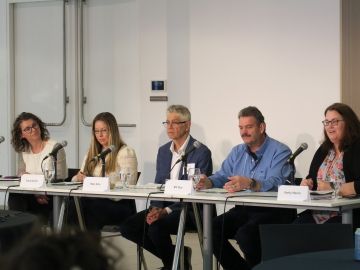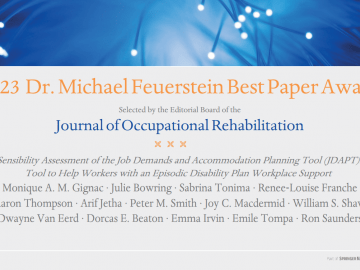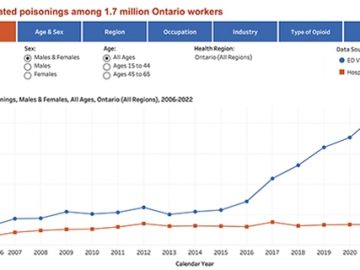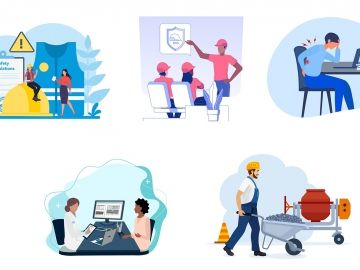What's new

Accepting applications: Fraser Mustard Postdoctoral Research Award
The Institute is now accepting applications for the Fraser Mustard Postdoctoral Research Award in Work and Health. Named in honour of Dr. J. Fraser Mustard, the chair of the first IWH Board of Directors, this award supports the development of outstanding new researchers in the field of work and health. With a focus on innovative multidisciplinary work and health research, the award is open to a range of academic disciplines including social, behavioural, and organizational sciences, as well as clinical and population health sciences. Apply by July 19.

Dates announced for IWH's Systematic Review Workshop
Want to deepen your knowledge on systematic reviews? IWH's systematic review workshop is back this spring! It will be held from June 20 to 21, in-person in Toronto. Attendees will learn how to plan, conduct and communicate the results of a systematic review. If you are a clinician, clinical trainee, academic or researcher with an interest in the methodology of systematic reviews, register by June 7 to attend.

Exploring how workplace solutions can mitigate opioid harms among workers
With the recognition that workplaces can play a part in responding to North America’s opioid crisis, the OCRC and IWH brought together over 100 occupational health specialists, government representatives, union advocates, researchers, and others to discuss how to prevent opioid harms among workers. Presentations, panel discussions and breakout sessions provided a lot of food for thought about the way forward.

Workers who had a work-related injury have higher risk of opioid-related harms than the general population in Ontario
An IWH study examined how opioid harms in a large group of Ontario workers who had a work-related injury compared to harms in the general Ontario population. They found that the workers had higher risks of emergency department visits and hospitalizations for opioid-related harms. This pattern was seen across most occupations and industries within this group of workers.

An IWH approach to sharing research
Need help getting your research out to the world? IWH has just launched a new guide to help researchers and organizations plan knowledge transfer and exchange (KTE) strategies. Informed by the research literature on KTE and IWH’s more than 30 years of experience, this guide aims to help enhance the relevance, quality and use of research to inform policy or practice. Topics covered include building stakeholder relationships, integrating stakeholder engagement throughout the research process, and using multiple channels to communicate research findings.

How do employment support programs impact the health of young adults with episodic disabilities?
The unpredictable and often invisible nature of episodic disabilities can make it challenging for workers to find and sustain employment while managing their fluctuating symptoms and work demands. For young adults navigating early career phases, these challenges may also have life-long impacts on their career progression and health. Researchers on an IWH study set out to investigate whether employment support programs for young adults with episodic disabilities may also impact their health.

Opioids and Work: Evidence, Perspectives and Looking Ahead [in-person event]
On Wednesday, March 20, join us for a full-day, in-person workshop on opioid-related harms among workers. The workshop will bring together employers, researchers, workers, policy-makers and health-care professionals to identify and discuss the underlying contributors to opioid harms and the workplace or policy initiatives that can tackle the issues. Register to save your spot for this in-person event.

IWH Speaker Series: Understanding OHS motivations and needs in small businesses
On March 19, Dr. Basak Yanar and Dr. Cameron Mustard will share findings from a study of small businesses in the Workplace Safety and Insurance Board (WSIB)'s Health and Safety Excellence program. They will discuss businesses’ motivations for taking part in the program, their OHS needs and challenges, and their perceptions of the program’s support.

Join our Board of Directors
Are you interested in contributing to the governance of IWH? We are now accepting applications from skilled and qualified leaders who are interested in sitting as members of the IWH Board of Directors. Board members play a vital role in championing the mission and work of IWH and contributing to its strategic directions. Applications will be accepted until April 14, 2024.

Construction safety org adapts IWH research messages for tradesworker audience
A key program from Construction Health and Safety New Zealand takes a participatory ergonomics approach to better prevent and manage musculoskeletal injuries among construction workers. This impact case study details how this evidence-based program was developed using insights from IWH research and tailored to suit those in the construction industry.

IWH Speaker Series recording: Is precarious employment an occupational hazard?
Precarious employment has become more common in the Canadian labour market, as well as in the labour markets of other high-income countries. In this presentation, Dr. Faraz Vahid Shahidi examines the consequences of precarious employment for health and safety at work. Drawing on compensation claims data, Dr. Shahidi asks whether workers exposed to precarious employment – such as temporary, part-time, and low-wage jobs – are more likely to experience an occupational injury or illness.

What can work-related COVID-19 cases tell us about how to prepare for the next pandemic?
To what extent did workplace exposures account for the transmission of the COVID-19 virus during the first two years of the pandemic? A new study by IWH combined data sources to estimate work-related infection rates, using a method that took into account major shifts in where people worked. It found the role of work exposure changed from wave to wave, in a dynamic pattern not in keeping with the number of cases in the general population.

IWH scientists on Stanford University’s list of world’s top 2% of scientists
Five IWH scientists have been recognized in Stanford University’s 2023 list of the top 2 per cent most-cited scientists in the world. “To have five IWH scientists out of a relatively small scientific corps included in this list of the world’s most cited scientists—it’s a tremendous honour,” says Peter Smith, IWH president and senior scientist.

Study on IWH accommodation tool for workers with episodic disabilities wins award
In the Spring of 2023, the Job Demands and Accommodation Planning Tool (JDAPT) was launched to help workers with chronic conditions and episodic disabilities identify job supports that they can implement without having to disclose their health condition. Now, a study that assessed the tool’s design has won the Dr. Michael Feuerstein Best Paper Award from the Journal of Occupational Rehabilitation.

IWH Speaker Series recording: Estimating the risk of workplace COVID-19 in different phases of the pandemic
The role of work exposure was at the heart of much public debate about policy decisions during the COVID-19 pandemic. But getting estimates of rates of work-related COVID infections was made all the more challenging by the overnight shift from in-person work to remote work, across many sectors of the economy. Watch a recent IWH Speaker Series presentation by Dr. Peter Smith, as he shared findings from a study that examined how occupational exposures were associated with work-related COVID-19 risk, taking into account these major changes in where and how people worked.

Lesbian, gay and bisexual workers in Canada more likely than straight workers to report low quality, precarious jobs
Drawing on a survey of Canadian workers, a recent study found that lesbian, gay and bisexual workers reported lower job quality than their straight counterparts. That’s according to a study co-led by an IWH researcher and IWH Syme award recipient, the most comprehensive study to date of job quality among sexual minority workers.

How job training can better meet the needs of persons with disabilities
Job training initiatives are an important gateway to work opportunities, especially for persons living with disabilities who face persistent barriers to employment. However, as technological advances lead to changes in the nature and availability of work, training programs that are responsive to the diverse needs of persons with disabilities become even more crucial. That’s according to a pair of IWH studies that found three key areas where these skilling programs should focus.

What research can do: IWH study on working at heights training well-received
An IWH study on the effectiveness of Ontario's mandatory fall prevention training was valuable to the province’s labour ministry in several ways. It confirmed training effectiveness and informed updates to the requirements. More than that, it reinforced the value of program evaluation at the system level. Read more in this summary of our latest research impact case study.

IWH Updates - Fall 2023
New interim director of strategic relations joins IWH ~ IWH welcomes new member to Board of Directors ~ IWH’s Scientific Advisory Committee welcomes new member ~ The Institute’s annual report highlights the changing nature of work ~ IDEA launches two new research awards

Homecare researcher given inaugural IWH early career award
Working as personal support workers (PSWs) can be challenging, especially so for those who provide services in homecare settings. But due to the dispersed nature of the workforce, studies about homecare PSWs are difficult to carry out. Now, an early career researcher at a large employer of PSWs is hoping to fill in that evidence gap—with financial support from a new award program at the Institute for Work & Health.

Just launched: New data tool illustrates patterns of opioid-related harms among Ontario workers
Which workers are most at risk of opioid harms? Find out with an interactive data visualization tool launched today. With the Opioids and Work Data Tool, members of the public can view patterns of opioid-related harms by occupation and industry, and by demographic factors like age, sex and geographic region. The tool was created through a collaboration between IWH and the Occupational Cancer Research Centre.

New data viz tool highlights patterns of opioid harms among Ontario workers
A new, interactive tool has just been launched to illustrate patterns of opioid-related harms in a large group of Ontario workers. With the Opioids and Work Data Tool, members of the public can view data on opioid-related harms by occupation and industry, and by demographic factors like age, sex and geographic region.

Employer versions of job accommodation tool help organizations think about worker needs
Since its release in March 2023, the Job Demands and Accommodation Planning Tool (JDAPT) has attracted a lot of interest. Now, two new editions for employers have been launched. They’re designed to give employers ideas—tailored to an individual worker or a job—on ways to support people who have difficulties with their job demands due to their health conditions.

New research award in work disability policy now open
Applications are now open to the David C. Onley Postdoctoral Research Award. This award, from Inclusive Design for Employment Access (IDEA) and the Ontario Disability Employment Network (ODEN), will be given to a researcher who embodies the values espoused by the late Honorable David C. Onley. Onley was the 28th lieutenant-governor of Ontario, a disability advocate, a champion for inclusive employment and a former broadcast journalist. Applications are due by January 15, 2024.

5 Things We Think You Should Know
Our annual edition of 5 Things We Think You Should Know is out now! This publication outlines five IWH research findings from the past year that we think can make a difference to workplace injury and disability prevention programs. It's available online and as a sharable PDF.

Lancet series calls for greater attention to work as social determinant of health
Work is a social determinant of health and decision-makers across government departments should look more to work interventions as potential levers for addressing health inequities. That’s a key message from a series of papers published in October 2023 by The Lancet, with IWH scientists among the co-authors.

Media release - Worker injuries due to falls from heights declined after training made standard and mandatory: study
November 3, 2023 (Toronto, Ontario)—In the three-year period after Ontario made working-at-heights training in the construction sector standardized and mandatory, the rate of fall-from-height injuries leading to time off work fell by 19 per cent, a study by the Institute for Work & Health (IWH) has found.

What is the impact of depression on years of employment among working-age adults?
If someone experiences depression, what is the impact on the length of their future working life? It depends on how, and when, someone experiences depression. An IWH study found five trajectories of depression in working adults, each with varied impacts on their future years of work.

Media Release - Addressing work conditions to improve public health: a series in The Lancet
October 12, 2023 (Toronto, Ontario)—Working conditions can have an impact on health and unequal health outcomes across the population. As a result, decision-makers from across different government departments should take greater note of work as a social determinant of health. That is a key message from a series of three papers published today in one of the world’s leading medical journals, The Lancet.

IWH study finds workers are using cannabis to treat work-related conditions, mostly without medical guidance
One in seven workers with a work-related physical injury or illness said they used cannabis to treat the condition. That’s according to an IWH study based on interviews conducted with workers 18 to 36 months after their work-related illness or injury. Importantly, most of these workers had not received medical guidance on the therapeutic use of cannabis.

IWH study examines RTW experiences of Ontario police service members
A recent IWH study examined the experiences of sworn and civilian Ontario police service members returning to their jobs after experiencing an injury or illness. The research team found that their return-to-work (RTW) challenges revolved around five main themes.

IWH researchers create roadmap for AI research that prioritizes worker health
What are the most urgent research questions on the impact of artificial intelligence (AI) on worker health and safety? Using expert insights, an IWH team has developed a four-part agenda to guide AI research and spark conversations between workplaces, workers and regulators. Its goal is to ensure worker health and safety are at the forefront of AI policy and adoption in the workplace.

What research can do: Following reports by IWH and others, B.C. strengthens protections against claim suppression
After an IWH study filled a research gap on workers’ compensation claim suppression in B.C. and helped make the case for change, the province amended legislation to strengthen protections against the practice. Read this shortened summary of our latest impact case study to learn more.

What do physicians need to know to support patients’ RTW?
While primary care physicians play an important role in helping ill and injured workers return to work (RTW), they have a variety of learning needs about how to best navigate the RTW process. That’s according to an IWH study that found that physicians could benefit from additional training in four main areas: administrative tasks, personal beliefs about RTW, specific occupational health issues and available RTW services and tools.

Scientist Dr. Arif Jetha appointed associate scientific director
IWH Scientist Dr. Arif Jetha takes on a new role as associate scientific director, effective September 1. In this role, he will work with the scientific director to ensure the standards of scientific evidence are maintained at IWH and that the scientific objectives set out in the IWH 2023-2027 Strategic Plan are fulfilled. Jetha will also play an active role in providing mentorship to IWH scientific staff, particularly those early in their careers, as well as post-doctoral, doctoral and masters students.

Telementoring program helps care providers with challenging RTW cases
The first two rounds of the world’s first ECHO program on occupational and environmental medicine (OEM) have wrapped up, and preparation is underway for a third round this fall. We spoke to some of the health-care practitioners who attended the first two rounds to learn how ECHO OEM has helped with their most challenging return-to-work cases.

IWH launches new award for early-career researchers
IWH is now accepting applications for the newly launched Cameron Mustard Early Career Accelerator Award. Named after the former president and senior scientist at IWH, this award was set up to honour Mustard’s commitment to mentoring future generations of work and health researchers and to strengthening the work and health research ecosystem.